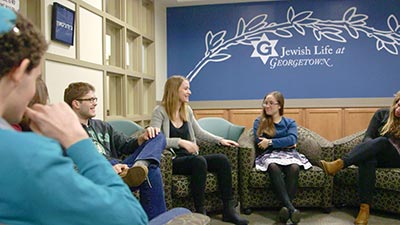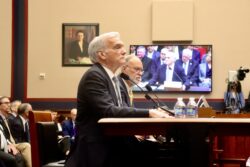Georgetown University formally launched its Center for Jewish Civilization (CJC) on Feb. 29 with a day of events. The launch of the CJC represents a new era for the study of Jewish Civilization at Georgetown, and is an expansion of the former Program for Jewish Civilization (PJC).
According to Professor Jacques Berlinerblau, Director of the CJC, the most important difference between a program and a center is that a center is fully endowed, which improves its longevity.
“I think the term is a little bit arbitrary, but in general, centers are defined by the amount of permanent endowment that they have,” said Berlinerblau. “In theory, [they] should have a minimum amount of endowment so that they can remain in existence forever. We hit that benchmark, and we went way past that benchmark.”
According to Berlinerblau, the CJC has already raised $25 million dollars.
The official launch took place Monday with day-long programming on contemporary European anti-Semitism. That night, the Center hosted a gala event at the Willard Hotel attended by 250 people, including President DeGioia. The Center already has more events on a wide scope of topics, under way.
“Since we don’t want to be interpreted as saying that Judaism is synonymous with hatred of Jews, we’ve been running other events. [The PJC] ran a four-week event called “Poetry at the Center,” where we brought Jewish poets in…That was extremely well-attended. And in April, we’re doing something called “Art at the Center,” where we’re going to bring Jewish visual artists to talk about their work at Georgetown,” Berlinerblau said.
The Center will benefit from a $10 million donation from Norman and Irma Braman to fund the forensic study of the Holocaust. According to Fr. Dennis McManus, professor and Associate Director of the CJC, $5 million is to support educational programs on the forensic study of the Holocaust. The rest of the donation supports an endowed professorship on the same subject area, which is to be held by Fr. Patrick Desbois.
The original Program for Jewish Civilization was founded in 2003 within the SFS and headed by the late Rabbi Harold White. “The use of [Civilization] is very intentional,” said Berlinerblau. “[Rabbi White] had taken the word from [Mordecai] Kaplan, and by Jewish civilization, I think that Kaplan was thinking something beyond just religion. He was thinking of polity. He was thinking of art. He was thinking of engagement with others. And the whole idea of Reconstructionist Judaism is every Jewish generation has to reconstruct, has to remake its Judaism. It can’t rely on what came before. So it’s a very dynamic vision of what this religion is about.”
Berlinerblau expects that the center’s launch will improve the undergraduate mentorship experience and deepen the university’s class offerings on the study of the Holocaust, the Jewish humanities, and American foreign policy concerning Israel.
While Berlinerblau thinks many Georgetown students will want to study foreign policy and the Holocaust, he thinks that promoting the study of Jewish literature and art on campus will be somewhat more difficult. “As for Jewish humanities, I think that’s the biggest challenge, and it’s not because of us or Georgetown. It’s because of the threat to the humanities in general. The humanities are under siege, and nobody quite knows why.”
Students are excited for what the CJC will offer. “I got the incredible chance to work with and be in a class with Professor Desbois,” said Annabelle Timsit (SFS ‘17). “I’m really looking forward to him being a full-time professor at Georgetown, and I think that the knowledge he has to bring and the experiences he’s had are just fascinating.”
Berlinerblau and McManus both see a bright future for the program. There are preliminary talks with College Dean Chester Gillis about a possible undergraduate major in Jewish Civilization, as well as a master’s program in Holocaust Education.
“Philanthropically, the future is very bright,” said Berlinerblau. “If you have competent, honest people with a lot of money in American higher education, you can do a lot of things.”
Photo: Georgetown University




